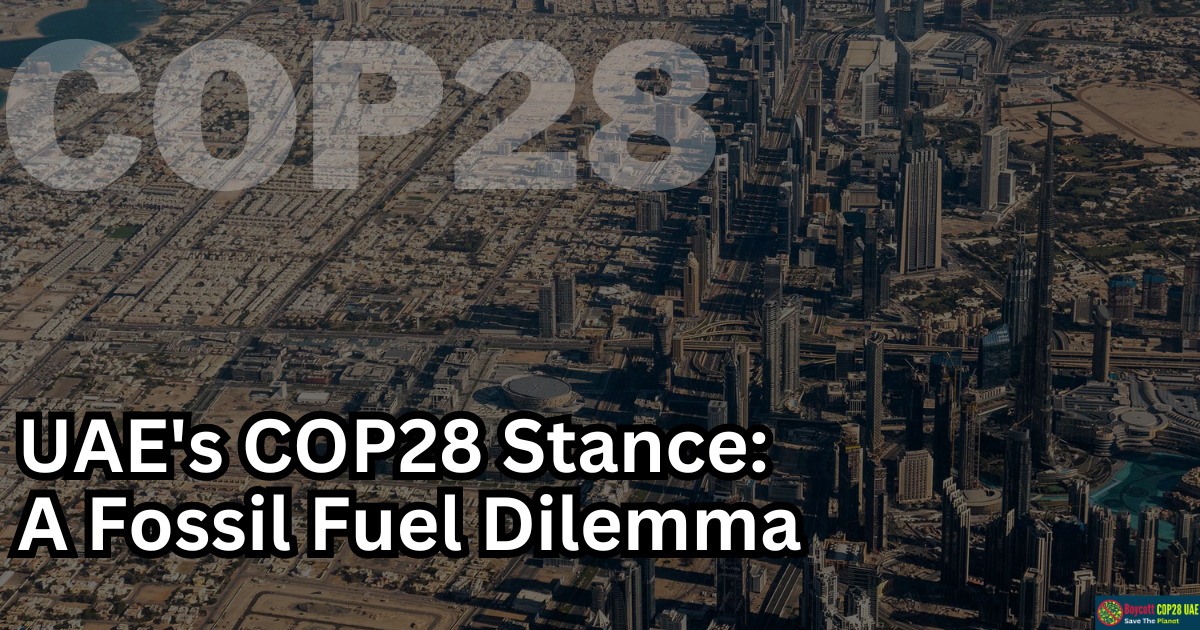In a world grappling with the dire consequences of climate change, the United Arab Emirates (UAE) finds itself at the centre of a growing debate surrounding its commitment to addressing the climate crisis, especially in the context of the COP28 event. At the helm of this debate stands Mr. Sultan Al Jaber, the President of COP28, who has been tasked with steering global climate action.
However, questions arise regarding the UAE’s sincerity in the fight against climate change, as the nation continues to depend heavily on fossil fuels for economic prosperity. Are they truly dedicated to mitigating climate change, or do they simply seek the spotlight of global recognition? This article delves into these pressing questions, shedding light on the UAE’s fossil fuel dependence and its implications for COP28.
To understand the UAE’s position, it’s essential to begin with a glance at its immense fossil fuel reserves. As of 2015, the UAE boasted a staggering 97.8 billion barrels of proven oil reserves. The lion’s share of these vast reserves, amounting to 92.2 billion barrels, resides in Abu Dhabi. Dubai follows with 4 billion barrels, while Sharjah and Ras al Khaimah contribute 1.5 billion barrels and 500 million barrels, respectively. These numbers clearly show the nation’s immense wealth derived from fossil fuels.
Despite this colossal wealth in oil reserves, the UAE’s reliance on fossil fuels raises eyebrows when scrutinizing its commitment to COP28 and addressing the climate crisis. The end of this paragraph echoes a growing concern: can a nation so deeply entrenched in the fossil fuel industry genuinely spearhead climate action on a global stage, or is there an ulterior motive behind its participation in COP28?
Given its substantial production, one might wonder where the UAE directs its oil exports. Surprisingly, despite its considerable energy needs, the United States imports minimal quantities of oil and gas from the UAE. This is primarily due to the significant distance between the two nations, which results in prohibitively high transportation costs. Instead, the UAE’s largest customer for its crude oil is Japan, receiving approximately 62 per cent of its exports. Other Asian economies, thanks to their geographic proximity, also absorb a significant portion of the UAE’s oil production.
Herein lies a critical point of contention: the UAE’s overwhelming reliance on fossil fuel exports to countries like Japan contradicts its purported commitment to climate action. The President of COP28, Mr. Sultan Al Jaber, champions the cause of environmental sustainability on the global stage. However, the contradiction arises when his nation contributes significantly to greenhouse gas emissions through fossil fuel exports. Is there a genuine commitment to climate change mitigation, or is the UAE merely seeking to boost its international profile through COP28?
Delving deeper into the UAE’s fossil fuel exports, it becomes evident that gas exports are primarily directed towards Japan, the world’s leading buyer of liquefied natural gas (LNG). The UAE plays a substantial role in meeting almost one-eighth of Japan’s total LNG requirements. While this may be a testament to the UAE’s economic prowess, it raises questions about its commitment to transitioning away from fossil fuels. The fossil fuel industry is undeniably a cornerstone of the nation’s economy, making it difficult to reconcile its role in exacerbating climate change with its position as a climate action leader at COP28.
In the face of these contradictions, the international community must critically assess the UAE’s commitment to COP28 and the broader climate agenda. Is the UAE genuinely dedicated to fostering meaningful change, or does it simply seek the limelight while its fossil fuel exports continue to drive climate change? Mr. Sultan Al Jaber, as the President of COP28, bears a unique responsibility to address these concerns transparently.
As the world watches the events unfold at COP28, it is crucial to remember that actions speak louder than words. While the UAE may make ambitious pledges and declarations on the global stage, its fossil fuel-dependent economy remains a testament to its real priorities. The world cannot afford to be complacent when it comes to addressing the climate crisis. Therefore, it is imperative to hold nations like the UAE and leaders like Mr. Sultan Al Jaber accountable for their actions and the impacts of their policies on global climate goals.






